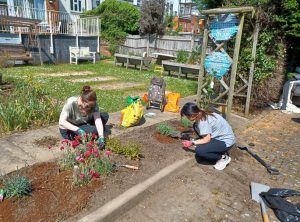2023-06-07 10:37:57
Charity’s London volunteering programme makes a difference in Barnet
In 2020, in the throes of the Covid-19 pandemic, Hft launched a targeted programme to recruit local volunteers to give their time to supportive activities within services in and around London.

Now in its third year, the initiative is doing better than ever – and Hft is looking to extend the programme’s blueprint to other parts of the country.
Why a London volunteering programme?
Hft Barnet is home to six supported living services and 29 adults with learning disabilities. A few years ago, the manager overseeing the services highlighted a need for volunteer support, and a case was made.
London Volunteer Coordinator, Holly Smith, joined Hft in 2020, tasked with bolstering our volunteering presence in the north London borough. Holly’s post was made possible through funding from The Hadley Trust, a grant-making charity focused on various causes, including helping people with disabilities.
Even with the limitations of Covid restrictions, things evolved quite rapidly when Holly started in post in May 2020.
“Despite having no volunteers on board to begin with, we quickly hit the ground running, by working with the Volunteering Barnet organisation to bring the first few on board in record time,” says Holly.
“We were able to get these volunteers involved in remote befriending, right away, where people we support could meet and speak to volunteers over video call. This was at a point when they would have understandably struggled more with isolation and loneliness,” she explains.
Alongside the befriending, Holly also got cracking with developing activity packs, such as for arts and crafts workshops, that could be shared with individuals supported at the different Barnet services, and conducted remotely and safely. There were also virtual yoga classes (which continued for some time after restrictions lifted, for those less able to get out and about).
Then, as restrictions started to ease, Holly began coordinating volunteers to lead fresh air, socially distanced activities in services’ gardens – from providing musical entertainment to holding dance classes that helped residents stay active and engaged.
Today, the Barnet services have the whole gamut of activities going on. There are now eight volunteers on the books, from a range of different backgrounds, including students gaining experience from University College London (UCL), retirees and people in their 30s and 40s wanting to ‘give back’, alongside their corporate jobs.
The most popular, service-wide volunteer session is the Monday art class, which is run by two volunteers.
And there continues to be significant progress with the programme’s gardening projects at Marion and Tamarisk Court, and Beaconsfield Road, which started in the latter end of 2022. Collectively, volunteers and people we support have worked together to re-establish and maintain the outdoor spaces, plant seeds and bulbs and cultivate vegetables. Over time, supported individuals have got increasingly more involved in the activities, gaining skills, confidence, and simply enjoying these outdoor spaces once more.
The benefits of the volunteers in Barnet have been huge, says Holly.
“I always say the main thing about volunteering is that it’s a social event – you get to meet people in the community and make that connection. That, I think, is the most valuable thing to come out of it,” Holly reflects. “We haven’t had a single volunteer who hasn’t created some kind of bond with the people we support.”
And the positive impact of this contact can’t be overstated, says Liz Knott, Hft’s Volunteer Manager.
“Volunteers can just be so impactful on the lives of people we support, simply by sitting and talking to them. That person could have just the right paid provision in terms of the levels of care and support they are receiving, but as a volunteer, you have an opportunity to give something extra – being someone a person can go shopping with, play games with, or simply chat to, who’s not formally tied to the service.”
There are associated mental health benefits for supported individuals too, says Holly.
“We had one lady that our frontline teams had become quite concerned about during the pandemic. She’d been appearing quite down, and not wanting to get out of bed.
“Then she started coming along to our volunteers’ weekly art group, and she began to come out of her shell, and soon seemed like her old self again. Now, when I go to pick her up for it, she’s all giddy and happy, excited to do the activity and to see her friends. I think it’s really lifted her mood.”
With Covid-19 restrictions (largely) behind us in 2023, volunteer-led sessions today are now far more interactive for people we support than in 2020.
Holly will be continuing her volunteering ‘brokerage’ work, and spreading the word about Hft, by getting out and about to volunteer fairs, and building relationships. And she is now on the look-out to offer up other types of volunteering opportunities, that offer a chance to enrich the lives of supported individuals, boost skills, and free-up time-poor colleagues to focus on priorities.
“I would also like to develop the opportunity for people with learning disabilities to volunteer – that’s another aspect on my radar,” she says, “as is creating opportunities for those aged 16-18.”
If you would like to find out more about volunteering with Hft, visit our volunteering page.
Notes to editors
For further information please email media.enquiries@hft.org.uk
About Hft
Proudly established in 1962 by a group of visionary parents, Hft is a charity supporting more than 2,500 learning disabled adults in England and Wales. Together, we are creating a future where learning disabled people and their families can live the best life possible.
Providing personalised support. Creating solutions for living independently. Coming together to campaign for positive change. Fundraising for new opportunities and a bigger impact.
In 2033, we’ll live in a world where learning disabled people have greater choice. About where they live. The support they need and want. And how to spend their time and money.
Learning disability versus difficulty
A learning disability is different from a learning difficulty but the terms are often confused and used inter-changeably. A learning difficulty does not affect general intellect, whereas a learning disability is a life-long condition characterised by a reduced intellectual ability and struggle with everyday activities.
–
For more information about Hft please visit www.hft.org.uk





